Wisdom Teeth Extractions Asheville
Protect Your Smile’s Long-Term Health
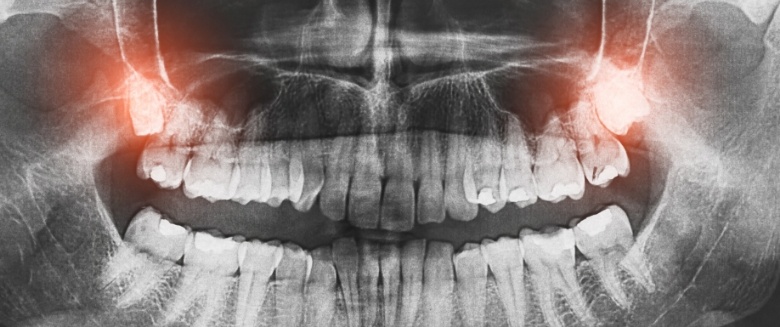
The wisdom teeth are a set of third molars that are the last permanent teeth to erupt in a patient’s mouth. They usually arrive somewhere in the late teenage/young adult years. Unfortunately, most modern jaws don’t have enough room to accommodate their arrival alongside the rest of the adult teeth, which is why potentially serious complications are so common. Dr. John White performs wisdom teeth extractions in Asheville as needed.
Why Choose Dr. John White, DDS For Wisdom Tooth Extractions?
- Trusted & Skilled Dental Expert Who is Here For You
- Sedation Dentistry Options for Nervous Patients
- Dental Insurance & Financing Options Available
Indications for Wisdom Teeth Removal

For some fortunate individuals, wisdom teeth do not cause any issues. However, for most people, problems eventually develop. If your jaw is sore near your wisdom teeth, or if food frequently gets stuck around them, those are strong indications that you should let Dr. White examine them to determine whether they should be removed. Some individuals who are not currently experiencing problems with their wisdom teeth choose to get them extracted as a purely precautionary measure.
Impacted Wisdom Teeth
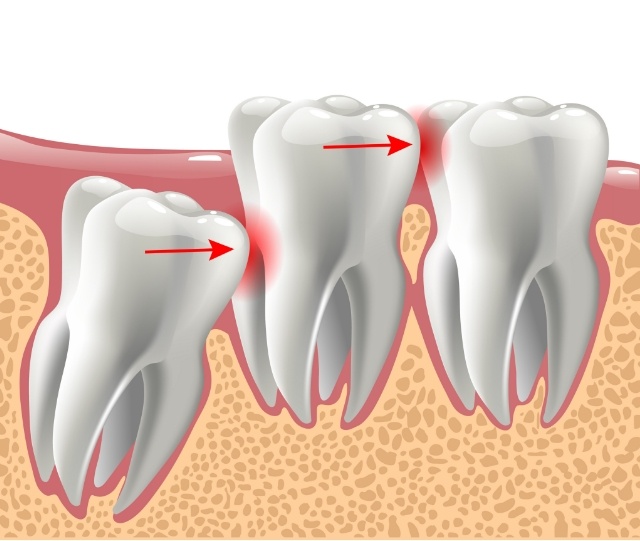
Many patients will experience fully or partially impacted wisdom teeth — this means that the teeth don’t have the room they need to erupt and develop normally. Wisdom teeth may grow at an angle or remain trapped in the patient’s jawbone. Impaction can lead to pain for the patient, higher risks of infection and tooth decay, structural damage to the surrounding bone, the development of cysts, and more.
Impacted Wisdom Teeth: The Basics
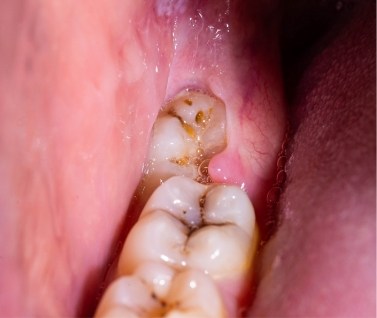
When you were a baby, you went through a process known as “teething,” which probably left you feeling uncomfortable at times because your teeth were erupting through your gums. Now that you’re an adult and your permanent teeth are in place, the pain you experience now is typically that of a toothache. But what about that immense pain in the back of your mouth?
Those would be your wisdom teeth, also known as your third molars. If your gums feel tender to the touch, it is because these unnecessary teeth are impacted and cannot erupt. If all the tooth is below the gum line, it is “fully impacted.” If the crown is showing but nothing else, you have a tooth that is “partially impacted.” Either way, the reason both of these situations happen is that you do not have enough room for your wisdom teeth.
The Dangers of Impaction

When these teeth remain impacted and go untreated, not only are you suffering from pain and soreness in your mouth, but the following complications can occur:
- Damage to nearby teeth: If your impacted wisdom teeth are growing at an angle, they can push and shift your other teeth out of alignment. This can result in not only wisdom teeth extractions but also the need for orthodontic work.
- Tumor development: Before you panic about the word “tumor,” this or a cyst is typically benign, but it can develop around the tooth and cause damage to nearby nerves, your jawbone, and even other teeth.
- Gum disease or tooth decay: When your wisdom teeth partially erupt, you’ll find it to be more difficult to keep them clean. You will be unable to floss effectively, making you more susceptible to gum disease and tooth decay.
Symptoms of Impacted Wisdom Teeth

If you have impacted wisdom teeth and feel no pain or tenderness, you are one of the lucky ones. However, just because you don’t notice any symptoms doesn’t mean that you shouldn’t have them removed. It’s also important that whether you notice any problems, you should continue to see your dentist every six months for a checkup and cleaning.
Some of the symptoms associated with impacted wisdom teeth include:
- Chronic bad breath
- Red, swollen, bleeding gums
- Tenderness or swelling in your jaw
- Pain
- Bad taste in your mouth
- Difficulty opening your mouth
- Swelling of the lymph nodes
If you notice any of the above-mentioned symptoms developing, make sure to contact your oral surgeon as soon as possible.
Do Wisdom Teeth Always Need to be Removed?
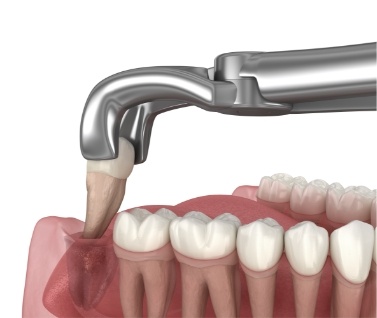
Surprisingly, wisdom teeth do not always need to be removed. Although seldom, there are a few reasons why an oral surgeon will not remove them:
- Your wisdom teeth fully erupt with no problems
- They are not impacting your nearby teeth
- Your oral health is in good shape after they erupt
Your dentist or oral surgeon will be able to evaluate your case and determine if it’s necessary to remove your wisdom teeth. Sometimes, it is best to extract them simply because they’re unnecessary and can pose future problems. As you age, the process of removing wisdom teeth becomes more difficult, so it is best if this procedure is done early on.
Preparing for Wisdom Teeth Removal

Before your procedure, our team will let you know the specifics of what you need to do to prepare. In general, patients should:
- Refrain from smoking for at least two weeks before the surgery
- Not eat for about 6 hours before the appointment (if you will be sedated)
- Have a friend or family member available to drive you to and from your appointment
- Stock up your kitchen with soft, easy-to-eat foods
The Wisdom Teeth Removal Process
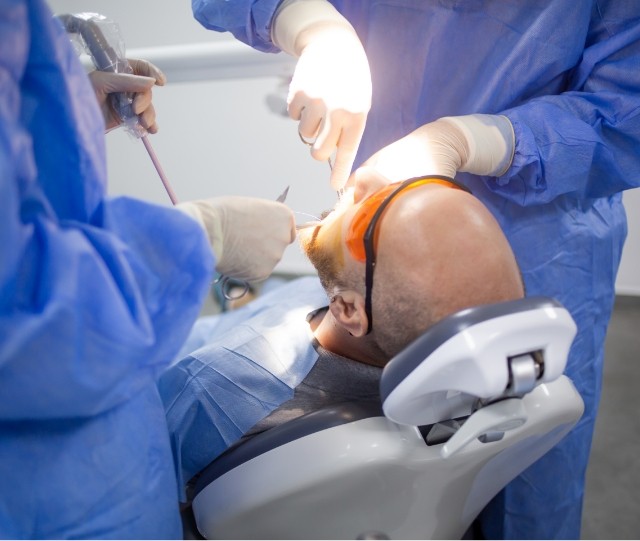
After you are sedated, Dr. White will access your wisdom teeth, possibly by creating an incision in your gums. Then, he will remove the teeth as gently as possible. In some cases, this requires that the teeth be broken into pieces. Depending on what you discussed before the procedure, Dr. White may remove all of your wisdom teeth at once, or he may remove only the ones that are posing the greatest threat to your oral health.
Wisdom Tooth Extraction Aftercare

Here are a few tips to help you while you recover from your surgery:
- Keep gauze at the surgical site for at least the first few hours
- Use ice to mitigate swelling
- Rinse your mouth regularly with warm salt water
- Eat only soft foods, such as broth or gelatin, until your mouth heals
- Brush and floss as normal, but avoid the area where the wisdom teeth were removed
Wisdom Teeth FAQs
You may have heard of friends or family getting their wisdom teeth removed, or maybe you have experienced this yourself. However, many still have questions about what wisdom teeth are, why they are removed, and more. Dr. John White wants to ensure that his patients have the information that they need before committing to any type of treatment, which is why he has compiled answers to some of the most frequently asked questions about wisdom teeth:
What are Wisdom Teeth?
Wisdom teeth are your third molars located in the far back of your mouth. These teeth are usually the last to develop, which is one of the reasons why there is not always enough room for them to grow properly.
At What Age Do People Get Wisdom Teeth?
Most people will get their wisdom teeth in their late teens or early twenties, which is why they got their name. These teeth develop when you’re older and hopefully wiser than when your other primary teeth grew in, which is why they’re called wisdom teeth. That said, it’s still possible to develop wisdom teeth as a pre-teen or older adult, but these instances are rare.
Does Everyone Have Wisdom Teeth?
No, not everyone gets wisdom teeth. Typically, 4 wisdom teeth will grow, but some people can even have just 1, 2, or 3 develop. Then, you may have some people who don’t get wisdom teeth at all, it will just depend on your specific case.
What Symptoms Indicate the Need for Wisdom Teeth Removal?
You should contact our office for wisdom teeth removal if you’re experiencing pain in your jaw, tenderness, swelling around the gums, infection or abscess, or parts of the wisdom tooth poking out of your gums. However, some people may not experience any of these symptoms and will still need to get them removed, which is why seeing your oral surgeon in Asheville for a consultation is vital.
Why Do Wisdom Teeth Need to Be Removed?
The main reason why wisdom teeth need to be extracted is that they can cause damage to surrounding teeth. If they are impacted or crowded, they can affect the alignment of your smile, your bite, and its overall look and function. However, if your wisdom teeth grow in correctly positioned and healthy, they may not even have to be removed.
